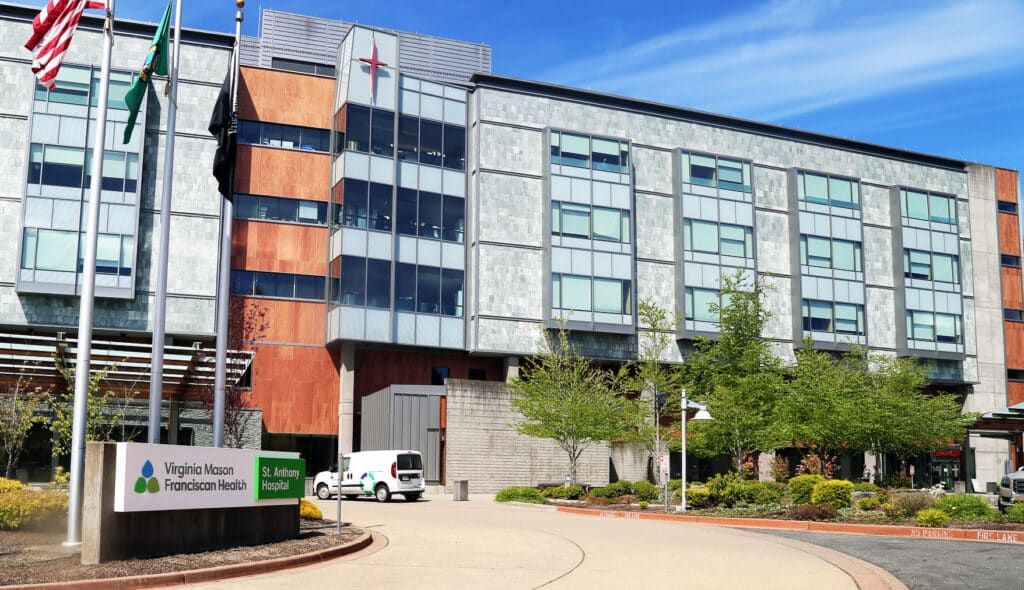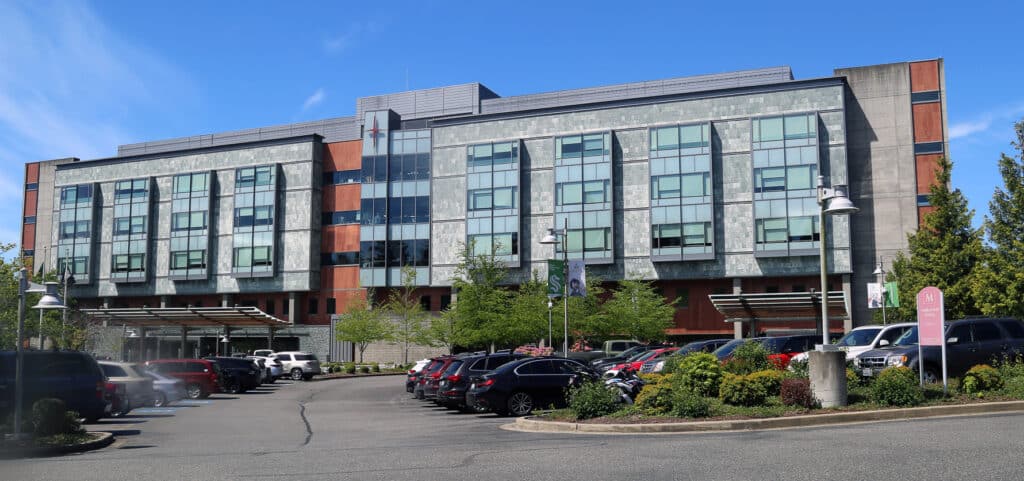Community Health & Wellness
Lack of crisis stabilization facilities places strain on hospitals
Across the West Sound, people experiencing a behavioral health crisis often end up in local hospitals.
Health & Wellness Sponsor
Health and Wellness stories are made possible in part by Virginia Mason Franciscan Health, a proud sponsor of Gig Harbor Now.
Every month, around 150 people in crisis arrive at the St. Michael Medical Center emergency room in Silverdale. Another 40 or 50 end up at St. Anthony Hospital in Gig Harbor.
Hannah Shockley, program management planner for Kitsap County’s Human Services Department, said there are few easy-access places for people suffering mental health or addiction crises.
“They all go to the hospital because that’s the only place we have for them,” she said.
Crisis stabilization — urgent care for those in crisis
The shortage of places available to stabilize people in a behavioral crisis is one of three gaps in services – alongside affordable recovery housing and prevention services – that Kitsap County hopes to address through its Treatment Sales Tax. The 1/10th of 1 percent sales tax will award about $8.6 million in grant funds specifically earmarked for mental health and substance abuse programming over the next year.
Crisis stabilization functions as a kind of behavioral health urgent care. Such facilities accept patients who have no other pressing medical concerns and, while in crisis, are not a threat to themselves or others.
Patients stay in these centers voluntarily for hours or days until they return to normal functioning. The centers then typically connect patients with resources and discharge them with a plan for follow-up care.
“We’re talking about somewhere that someone can go – no barriers – where they can access it when they’re in crisis. They can be assessed. If they need medication they can get that medication and they are further monitored,” Shockley said.
After they are stable, “there’s some type of a discharge plan. There’s follow up care that moves people out of the cycle.”

The main entrance at St. Anthony Hospital in Gig Harbor. About 40 to 50 people in need of crisis stabilization end up at St. Anthony every month. Photo by Vince Dice
Challenges of crisis stabilization
Crisis stabilization services play an important role in the behavioral health continuum. They offer a cost-efficient alternative to hospital inpatient care for people in crisis, keeping hospital beds open and connecting people with appropriate psychiatric care and other social services.
However, a variety of factors make stabilization facilities difficult to operate. They have to be open 24/7 and require qualified staff willing to work with high-acuity patients. That’s expensive. Attaining long-term financial stability, particularly when a majority of patients are on Medicare, is also a challenge.
“Our contributions — and those of our community partners – can only go so far,” St. Michaels president Chad Melton said. “There is a general lack of state funding for these critical services and reimbursements continue to be an issue.”
St. Michaels is the only hospital on the peninsula that provides such specialized care. It makes the medical center a safety net for Kitsap and its surrounding counties, Melton said, putting added pressure on its emergency room.
That includes additional daily patient loads and the financial impacts of boarding patients long-term. A quarter or more of the cost of caring for patients on Medicare or Medicaid goes unreimbursed, Melton said.
Dual roles for Silverdale hospital
St. Michaels is equipped to care for patients with a dual medical emergency and mental or behavioral health crisis. Clinical care teams have behavioral health training and psychiatrists are on staff.
But the hospital is not a licensed behavioral health facility, Melton said.
They attempt to address the patient’s immediate medical needs and stabilize them so they can get to a place that’s most appropriate for care, he said.
“The challenge comes when someone has more complex medical needs that require long-term care as well as behavioral health needs and there is no place to transfer them for this care,” he said. “This can lead to someone staying at the hospital for an extended period and/or being eventually discharged without appropriate care in place.”
Where Gig Harbor patients go
Further south in Gig Harbor, the majority of people who law enforcement find in crisis end up at St. Anthony Hospital or Wellfound Behavioral Health Hospital in Tacoma, city Police Chief Kelly Busey said. Virginia Mason Franciscan Health owns both hospitals, in addition to St. Michael’s.
Gig Harbor Police rarely took people in crisis to either of Pierce County’s two stabilization facilities, Busey said. They never used the Crisis Recovery Center in Spanaway and had seen declining use of the Recovery Response Center in Fife.
Those two centers, which collectively provided 32 beds for short-term voluntary stays for people in Pierce County, both temporarily closed on March 8, after its provider suddenly pulled out.
Tiffany Villines, director of Carelon (the Behavioral Health Administrative Service Organization for Pierce County that oversees the centers) said they are working to get an interested provider to reopen the facility.
They hope to have identified a new company by late summer, she said.
Kitsap County center
In Kitsap, the Kitsap County Crisis Triage Center is the only crisis stabilization facility in the county. Kitsap Mental Health Services opened the 16-bed facility in East Bremerton in 2018. It provides short-term stabilization for up to five days for adults in psychosocial crisis.
“We’re not going to solve that (problem) in three to five days but we’re going to get them plugged into the resources they need,” said Dr. James Hughes, KHMS’ chief medical officer. Last year, they provided 770 crisis stabilization plans for people who came through the triage center, Hughes said.
Patients at the center receive around-the-clock care from mental health professionals, their own bed and meals. Staff connect them with housing or other social services and discharge them with a care plan. If they have substance use disorder they may move directly into KMHS’ 28-day rehab center.
The center accepts patients via referrals from local emergency rooms, law enforcement, jails and the Kitsap Recovery Detox Center. Members of the KMHS mobile crisis outreach team can also refer people to the center.

St. Anthony Hospital in Gig Harbor. About 40 to 50 people in need of crisis stabilization end up at St. Anthony every month.
Other options
The facility is not a perfect or necessary solution for everyone who is in a mental health crisis. Some people may be able to stabilize without staying overnight or after speaking with a member of the KMHS mobile crisis team.
Others may need to go to the hospital first because they have a co-occurring medical emergency or need their vitals checked. The triage center does not require patients to be medically cleared before entering, but they often require a visit to the hospital before intake.
Hughes said they try to bridge gaps as much as possible, but they don’t have 24/7 medical or pharmaceutical on site. If someone complains of physical symptoms, like chest pains, or has a condition like diabetes they may be unable to care for them.
“A lot of times when we find somebody in the community in crisis, especially if it’s on the street, they’ve already become injured or they have untreated medical issues that they need to address first before they can safely be at a residential unit.”
Hospital is often first stop
Kevin McCarthy, a spokesperson for the Kitsap County Sheriff’s Office, said the intake policy at the center has fluctuated and only accepts patients under strict guidelines without first seeking care at the hospital.
To save time, some deputies take people to the hospital first to ensure any problems are identified and cleared, he said. He added that most people in crisis likely have additional medical issues.
Rachelle Evinski, a behavioral health navigator with the Bremerton Police Department, said while it is easy to check people into the crisis triage center, the availability of beds varies. Some people may also decline to go to the center, she said.
Patients at the crisis center are there voluntarily. A person cannot be forced into care unless they meet the threshold for involuntary detainment. Under state law that requires the person is either gravely disabled or is a danger to themselves or others.
“I can have a conversation with that person, create a safety plan and then they may not want to go,” she said. “They may realize that they have enough natural support in the environment that they’re in. It’s really based on the person and the day.”
Addressing the gaps
Hughes said he is encouraged by community efforts to address its need for behavioral health care. He emphasized that the system now has more coverages than gaps.
In addition to the crisis triage center, KHMS launched a mobile crisis team in 2022 composed of mental health professionals that can be dispatched to anywhere in the county. They added a youth-specific crisis team in 2023, serving Kitsap, Jefferson and Clallam counties.
In the last 12 months, the mobile crisis team made over 2,600 contacts, Hughes said. Yet, it remains difficult to get some people to seek treatment, he said.
“I think where we see some of our gaps is in people who are struggling to get to a point where they are really going to be accepting of care,” he said. “When people are on the fence and trying to decide if they really want treatment, it’s challenging for them to find people to sit with them through that discovery process.”
Prevention
Monica Bernhard, CEO of KMHS, says while not dismissing the importance of crisis services, it is an expensive model and a struggle to find and attract “mission driven people” who want to work in that space, especially outside of a major metro area.
To build an effective system, it is important to catch people before they reach the point of crisis, she said. That involves more funding directed to mental health services, which she notes typically are cash-strapped.
A robust system she said would offer more outreach programs, outpatients treatments and be able to treat everyone regardless of insurance.
“Prevention will always be better,” she said. “I don’t wanna minimize the crisis system because prevention is not gonna get everybody, but if we can invest more in outpatient as well and find that right balance, I think that’s what we need to do as a community.”

